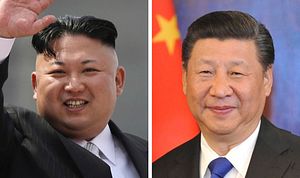From the time of Hua Guofeng, every top leader of the Chinese Communist Party has visited North Korea, including Hu Yaobang, ZhaoZiyang, Jiang Zemin, and Hu Jintao. However, since he took office in November 2012, Xi Jinping has not yet made that trip. The last time he went to this neighboring socialist country was as vice president in June 2008, when he met with the previous North Korean top leader Kim Jong Il, the president of the Presidium of the Supreme People’s Assembly Kim Yong Nam, and others.
Since 2018, the situation on the Korean Peninsula has relaxed, and in the meantime Kim Jong Un has strived to improve North Korea’s relationship with China. From last March to this January, Kim Jong Un visited China four times, and Xi ought to pay a return visit. Last year, when North Korea celebrated the 70th anniversary of its founding, Xi did not visit Pyongyang, and only sent Li Zhanshu, the chairman of the National People’s Congress Standing Committee, as his special envoy. Kim may have felt disappointed about Xi’s absence.
This January, during his visit to Beijing, according to a report of the state-run Korean Central News Agency, Kim invited Xi to visit North Korea at a convenient time, and the latter “accepted the invitation with pleasure and informed Kim Jong Un of the plan.” South China Morning Post reported in January that according to a source in the South Korean parliament, Xi would visit Pyongyang this April. Whether this report is reliable remains to be seen. Yonhap News Agency reported recently that perhaps Xi would visit North Korea by the end of June or early July, but this also needs verification.
October 6 of this year marks the 70th anniversary of the establishment of diplomatic relations between China and North Korea, and key Chinese political figures traditionally visit Pyongyang for such celebrations. In 2009, then-Premier Wen Jiabao visited North Korea from October 4 to 6. If Xi does decide to visit North Korea this year, then, another possible and appropriate time is early October.
It is helpful here to review the developing history of diplomatic relations between North Korea and China. In May 2000, Kim Jong Il paid his first unofficial visit to China after he became the general secretary of the Workers’ Party of Korea. Before that, the relations between China and North Korea had been cool for several years. In January 2001, he visited China again. In September 2001, Jiang Zemin, the general secretary of the Chinese Communist Party at the time, paid an official visit to North Korea, with his trip coming more than one year after Kim Jong Il’s first visit to China. If Xi’s visit to North Korea is realized this year, especially this summer or autumn, there will also be more than one year between this visit and Kim Jong Un’s first visit to China.
However, there are some other factors that will influence Xi’s decision whether to visit North Korea, including North Korea’s denuclearization process, changes in relations between the United States and North Korea, and even fluctuations in Sino-U.S. relations. If North Korea’s denuclearization process stays at an impasse, and U.S.-North Korea relations cannot be improved, a visit from Xi to North Korea might have negative consequences. In October 2005, Hu Jintao, the general secretary of the Chinese Communist Party at the time, visited North Korea after the issuing of September 19th Joint Statement, the interim achievement of the Six-Party Talks on the North Korean nuclear program. This made it a somewhat favorable time for Hu to visit North Korea. However, will there be similarly favorable conditions in place for Xi to visit Kim Jong Un’s country this year?
The Trump-Kim Hanoi summit ended without any outcome on February 28, and the prospect of the denuclearization of the Korean Peninsula remains unclear even now. If the North Korean nuclear impasse remains difficult to break, and the U.S.-North Korea relationship proves hopeless to improve, the United States may gradually step up the pressure on North Korea. Compared with his predecessor Hu in 2005, it would be somewhat more difficult for Xi to decide to visit North Korea this year.
Last September when North Korea saw the 70th anniversary of its founding, Xi did not visit Pyongyang, because he was unwilling to influence the unstable and somewhat sensitive relationship between China and the United States for the sake of North Korea. These two great powers are still having issues with trade and other aspects, and it remains to be seen whether the United States will place heavy pressure on China specifically over the North Korea issue. Under these circumstances, if his visit to North Korea is realized this year, it will be proof that Xi is determined to improve the relationship between China and North Korea, which is very important to Kim Jong Un.
Will Kim be disappointed again this year? We will have to wait and see.
The Chinese version of this article was published in Lianhe Zaobao Newspaper (Singapore) on April 10, 2019.
Rongjie Lin (Henry R. Lin), Ph.D. in history, is an independent researcher and writer based in Toronto and Beijing.

































